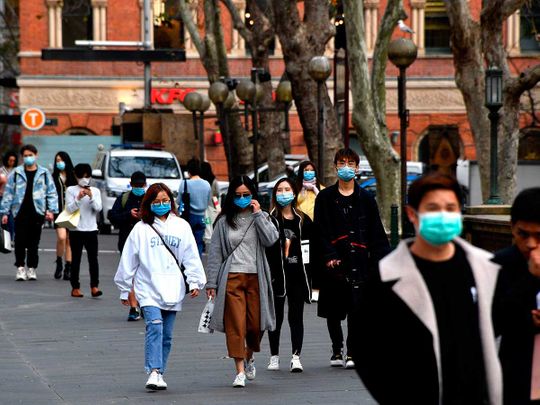
CANBERRA, Australia (AP): Australia has announced it will spend 500 million Australian dollars ($351 million) to secure COVID-19 vaccines for the Pacific and Southeast Asia "as part of a shared recovery for our region from the pandemic.'' The government said it would use a range of advance purchase agreements with manufacturers via the global COVAX Facility plan, which aims to ensure virus vaccines are shared with all nations.
"We are committing an additional AU$500 million over three years towards this effort,'' it said. "The funding will further help ensure that the countries of the Pacific and East Timor are able to achieve full immunization coverage, and will make a significant contribution toward meeting the needs of southeast Asia. "A fast, safe vaccine rollout ... will mean we are able to return to more normal travel, tourism and trade with our key partners in the region.''
Meanwhile, officials in Victoria state reported just one new case of COVID-19 on Saturday as Melbourne residents head into a weekend of greater social freedom. Figures from the state's Health Department show an average of just 2.4 new cases per day for the past 14 days.
The easing of restrictions means families can visit each other at home. A 25-kilometer (15-mile) travel limit remains in place and outdoor gatherings are still capped at 10 people. It will be an emotional weekend for many people who have been unable to see their families or close friends for months.
Victoria's COVID-19 death toll stands at 819 and the national figure is 907. State premier Daniel Andrews did not face the media on Saturday, bringing his daily news conference marathon to an end. The state leader had held news conferences for 120 consecutive days starting on July 3.
UK vaccine chief warns of over-optimism, early imperfection
LONDON: Warning that the first COVID-19 vaccines may be imperfect, the head of the U.K effort to develop a vaccine called Wednesday for immediate international cooperation to prevent the "largest global recession in history.'' U.K. Vaccine Taskforce chair Kate Bingham also warned against over-optimism, saying there is no guarantee a successful vaccine against the novel coronavirus will ever be developed.
"The first generation of vaccines is likely to be imperfect, and we should be prepared that they might not prevent infection, but rather reduce symptoms, and, even then, might not work for everyone or for long,'' Bingham wrote in an essay published in The Lancet medical journal.
No vaccine has ever been developed against any coronavirus, and numerous attempts to design vaccines against SARS and MERS, two which are related to the virus that causes COVID-19, have failed. Scientists also warn that immunity against coronaviruses appears to fade over time and that achieving any vaccine-induced immunity to protect against infection or severe disease could be challenging. Bingham's comments come as government leaders in Britain and other countries are basing their COVID-19 strategies on expectations of a vaccine becoming available as soon as early next year.
Prime Minister Boris Johnson, for example, has implemented a three-tiered regional strategy aimed at slowing the spread of the disease until there is a vaccine while also minimizing the economic damage from another widespread lockdown. Meanwhile, coronavirus cases, hospitalizations and deaths in the U.K. and elsewhere in Europe are rising amid a second wave of infections.
Britain created the Vaccine Taskforce earlier this year to speed the development of a vaccine. Two candidates are in late stage trials, with results expected around the end of the year or early 2021. Dozens of other potential vaccines are in earlier stages of development. But Taskforce chair Bingham said the candidates that have progressed the most in testing are based on new approaches with little history of being used in vaccines. Vaccine candidates based on more frequently used methodologies aren't likely to be ready until late 2021, she added.
In addition, it will be a challenge to rapidly produce enough vaccines to combat the virus. The global manufacturing capacity is "vastly inadequate for the billions of doses that are needed,'' she wrote in The Lancet.
'China, Europe, the USA and the U.K. need to work together'
"China, Europe, the USA and the U.K. need to work together,'' Bingham wrote. "If we establish international collaboration right now, then we will be better prepared to control future pandemics without causing the largest global recession in history and the biggest threat to lives in living memory.''
The World Health Organization says it hopes first-generation coronavirus vaccines will have an efficacy rate of at least 70%, but it has acknowledged that 50% might be more realistic. The European Medicines Agency has not specified any minimum efficacy threshold for COVID-19 vaccines and said they would be evaluated on a case-by-case basis.
___
Sri Lanka police arrest people not wearing mask
For the first time, Sri Lanka police have arrested dozens of people for not wearing masks and failing to maintain social distancing, under the new laws imposed to contain the spread of the coronavirus. Police spokesman Ajith Rohana said 39 people were detained, and separately, another 221 were held for violating a curfew. Since Thursday, the government has imposed the curfew in the whole of Western province where new outbreaks at a garment factory and the main fish market were discovered early this month. It includes the capital Colombo, where nearly 30% of the 22 million population live. Infections from the two clusters have grown to 6,945 by Saturday, bringing to over 10,000 the number of confirmed cases in the country including 19 deaths.








